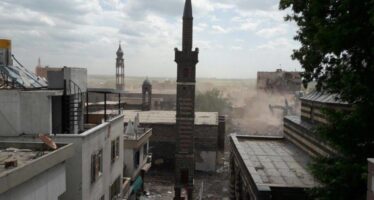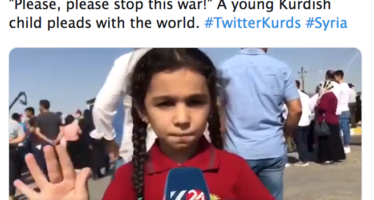Kurds make big gains in Turkish election
![]()

Kurds celebrate elections results in southeastern province of Hakkari, where BDP won three seats to the parliament.
Pro-Kurdish candidates nearly doubled their seats in Turkey’s national elections, making sure the autonomy-seeking minority’s demands for greater rights get heard loud and clear in the months to come.
Prime Minister Recep Tayyip Erdo?an’s ruling party was the big winner in the weekend ballot, taking 50 percent of the vote to give it an impressive mandate in its third straight term in power.
But the other story of the election was the strong gains made by Kurdish rights candidates, who needed to run as independents to get around rules requiring a party to get at least 10 percent of the vote to get into Parliament.
A total of 36 candidates backed by the pro-Kurdish Peace and Democracy Party (BDP) won seats, a gain of 16 from the previous election.
Among them was Leyla Zana, a former lawmaker who spent 10 years in prison on charges of links to outlawed Kurdistan Workers’ Party (PKK) that she always denied. In 1991, Zana also caused an uproar for speaking Kurdish while taking the oath of office, in defiance of rules against use of the language in official settings.
PKK members, deemed terrorists by Turkish, the US government and the EU, have been fighting a decades-long battle for independence in Turkey’s northeast. More moderate Kurds say their main goals are to win basic rights like teaching their language in schools.
On Monday, Western poll observers said the elections were well-managed and demonstrated pluralism but that the country needed to expand media freedoms and free expression to strengthen democracy.
In particular, the delegation from the Vienna-based Organization for Security and Cooperation and the Strasbourg, France-based Council of Europe criticized the 10 percent threshold, saying it prevented Parliament from being truly representative.
Independent candidates running for the BDP attracted around 60 percent of the votes in at least three mainly Kurdish provinces in the southeast and won large protest votes in some Turkish cities, such as ?stanbul.
Erdo?an, who has promised to replace the constitution written in 1982 under the military, said in a victory speech late Sunday that he would work with other political parties and NGOs for more laws to boost democracy and freedoms.
Kurds, who make up around 20 percent of the population of 74 million, are making more forceful demands for autonomy and the right to education in the Kurdish language. They also want the 10 percent electoral barrier lowered.
Imprisoned PKK leader Abdullah Öcalan, whose organization has led a 27-year-old fight against Turkish security forces, has threatened more attacks unless Erdo?an’s government negotiates an end to the conflict that has killed tens of thousands of people.
“The second victors of the election were (the Kurdish) party,” said Huseyin Çelik, a senior ruling party official.
“But they should not regard themselves as the sole representatives of the Kurds,” he said Monday, referring to a strong showing by the ruling party in some Kurdish areas.
Two candidates in prison on charges of being part of an alleged hardline secularist plot to bring down Erdo?an’s government were also elected.
Journalist Mustafa Balbay and Mehmet Haberal, a surgeon and founder of a university, were running on the ticket of the opposition Republican People’s Party (CHP). There is debate about whether the two would be entitled to parliamentary immunity that would free them from jail.
Related Articles
History destroyed in Sur: Concrete houses are sold for 1 million TL
![]()
Six neighbourhoods of the borough of Sur in Diyarbakır (Amed) have been banned for 5 years. Six neighbourhoods surrounded by concrete blocks first and then by 3 meters long iron sheets have been banned for 1,826 days.
Investigation demanded on U.S. role in Roboski slaughter
![]()
The Roboski slaughter on 28 December was allegedly carried out by warplanes sold by the U.S. In a joint letter
World Resistance Day for Rojava. Truly We Live in Dark Times
![]()
World Resistance Day for Rojava. A poem by Séamas Carraher




